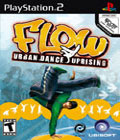Genre: Action
Publisher: Ubisoft
Developer: Artificial Mind And Movement
Release Date: November 15, 2005
Dancing is life, some say. Bob Marley said, "Forget your troubles and dance." An old axiom goes, "If you can speak, you can sing; if you can walk, you can dance." It's a part of a great many cultures, including America's young urban youth. An innumerable list of unique dancing styles have come from the inner city, all keyed to the hip-hop beats that have defined a musical genre. So, of course, it was only a matter of time before someone decided to try and harness this unique flavor and slap a Dance Dance Revolution clone on top. The result is far less revolution and much more redundancy.
Flow: Urban Dance Uprising is exactly what the intro blurb says it is: Dance Dance Revolution runs into the "hood" and tries to fit in. Instead of heavy techno and J-Pop, the soundtrack is rap, trip-hop, and a smattering of breakbeat. DDR's stylish dancers and throbbing discotheques have become poor kids in oversized clothing and grimy subway platforms. Beyond a simple change of setting and theme, there's nothing in Flow to differentiate it from the dozens of "dancing simulators" that have come before it. It is yet more arrows, rising towards the top of the screen in a convoluted pattern. The single-player game, which seems to be the predominant mode, allows you to pick a dancer from a small cache of joes, all with different styles (supposedly), in order to run through a series of mission-based levels.
The challenge here comes at a premium only: most of the "missions" aren't exactly tough, especially with the choice of difficulty and song being left up to you. If the player wants to select Easy and a simple song they know they can whip through (or combo or high-score or whatever), there's nothing stopping them. No matter which character you choose, the rewards are always the same (and not necessarily for the character you're using), so once you're done, you're done forever. The rewards aren't monumental, either, consisting of new clothes, a few new dancers, Super Moves (more on that later), new songs, or the next setting.
The game engine itself doesn't help make things feel any newer. The character models are bland, and while animated well, only have a small repertoire of dance moves to choose from. The crowd may as well be unanimated, given their total lack of involvement — the audio responses we've come to appreciate in DDRare reduced to a rare "oooo" — and your opponent in the single-player mode simply stands there and sways with the beat while you do your thing. Dancing animations sometimes jump and jerk during changes. Even the arrows have problems with bland designs and similar colors that can make it difficult to differentiate off-beat arrows.
That's all secondary in a "dance simulator," though, to the actual gameplay. The whole DDR craze is about the music and the high-intensity step charts, but Flow picks up no points here. If anything, there's a reason why techno is chosen for these games over hip-hop: where techno is all about consistent downbeats, heavy rhythm lines, and complex patterns, hip-hop lays more emphasis on the vocals and technical patterns with lots of changes. This is no mark against hip-hop — I'm rather fond of it — but with heavy syncopation and tracks that don't sync to the backbeat or change almost randomly, this is just not music you can dance to DDR style without feeling very disconnected. It's more comfortably handled on the controller, of all things.
It's not that these are the most graceful of step patterns anyway. Often, even medium difficulty songs are simplistic and boring, but switching up to the higher difficulties is inviting broken ankles and confused swearing at super-dense arrow groups and a lack of consistent patterns. Most of the step patterns are what the Stepmania! online groups would call "keyboard steps" or "unpadable," meaning it's no fun (or impossible!) to safely dance through the song. The manual mentions Super Moves a few times, icons that appear randomly and allow you to optionally switch to a harder pattern for more points. After multiple playthroughs, I still couldn't get one to come up. Later, it was pointed out that all the super moves are initially locked down until you clear the specific unlocking level for that character.
"Bland" pretty much sums up the entirety of Flow. It really brings back nightmares of Get On Da Mic, another game that attempted to massage hip-hop overtures into an established rhythm game (in that case, it was Karaoke Revolution). Both hit the same general snag: in attempting to ride on the coattails of a spectacular title, neither game managed to do anything more than come off as an inferior clone. In the world of "dance simulators," there are so many other choices — Dance Dance Revolution and all of its two dozen sequels, the somewhat-different but equally intense Pump It Up!, or even recent upstart In The Groove — that spending time with Flow feels unnecessary. It's in no way a bad game, but there's not much here to draw in the people who would truly appreciate it.
Score: 5.5/10
More articles about Flow: Urban Dance Uprising













 Flow: Urban Dance Uprising features classic breakdancing gameplay and a soundtrack of hip hop artists including the Sugar Hill Gang, Kurtis Blow, and Eric B & Rakim. Gamers can compete against as many as seven other players and choose from a host of dancers that perform classic breakdance moves in one of 10 different urban settings.
Flow: Urban Dance Uprising features classic breakdancing gameplay and a soundtrack of hip hop artists including the Sugar Hill Gang, Kurtis Blow, and Eric B & Rakim. Gamers can compete against as many as seven other players and choose from a host of dancers that perform classic breakdance moves in one of 10 different urban settings.

